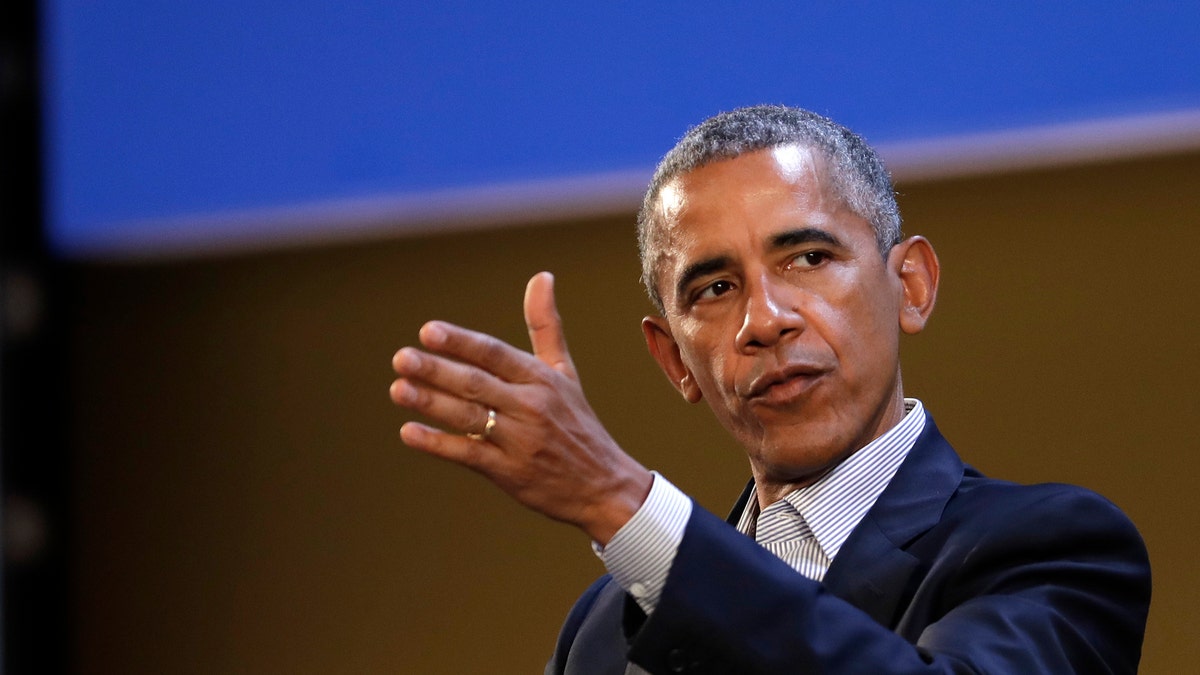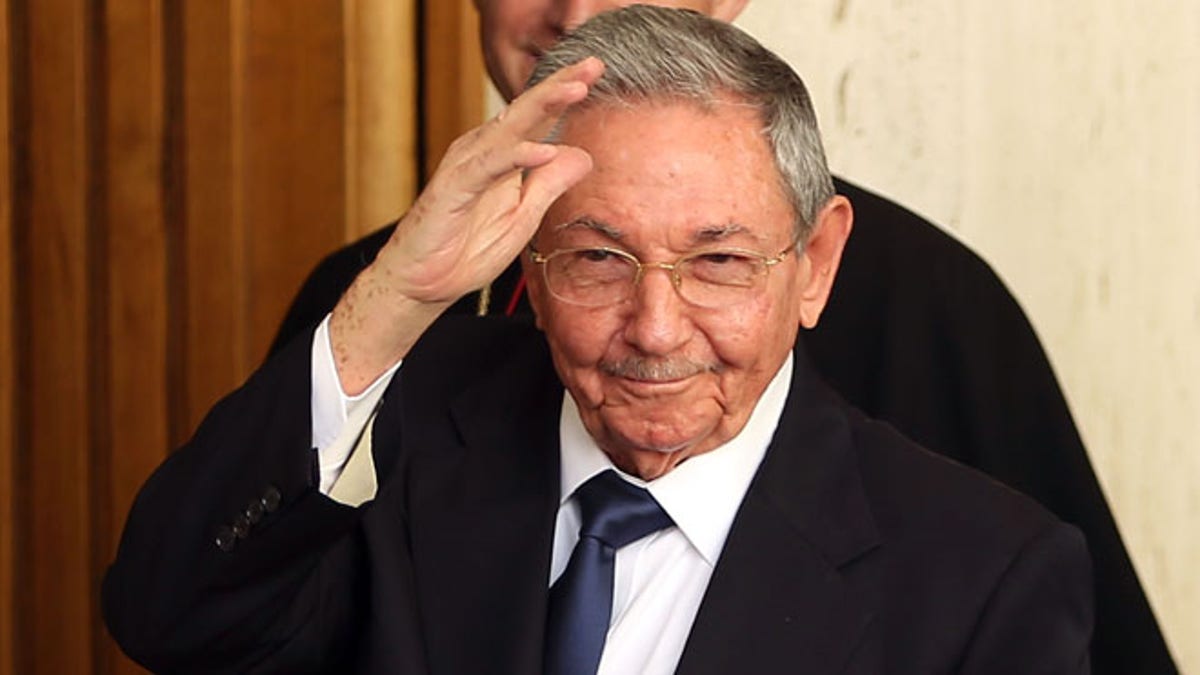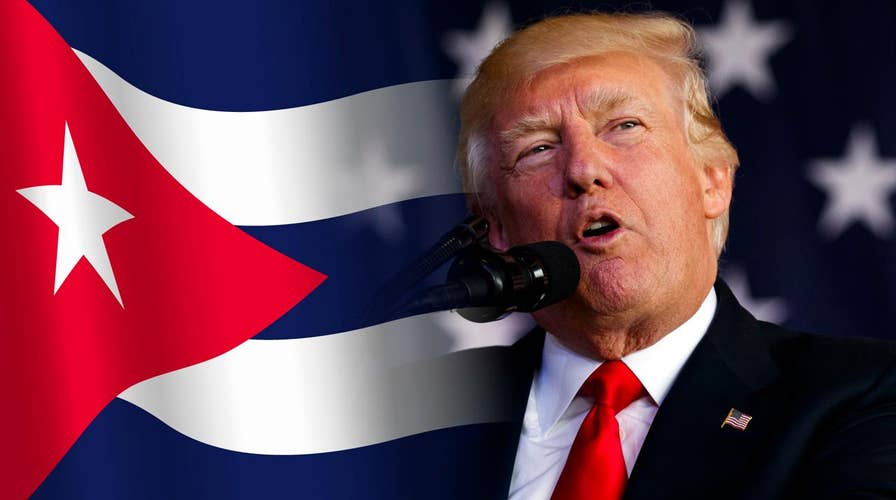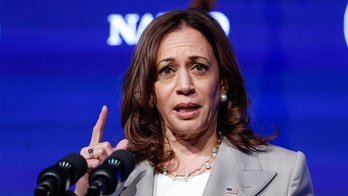President Trump is reviewing US policy toward Cuba
Rich Edson provides insight on 'Special Report'
James Williams, president of a coalition that works for normalizing U.S.-Cuba relations, was busy on Capitol Hill this week trying to persuade administration officials not to reverse travel and trade policies with Cuba that were eased by President Obama two years ago.
Williams, who heads Engage Cuba, said it seems inevitable that the White House -- which has not made any announcement about changing America's Cuba policy -- will roll back some steps his predecessor took in 2014 toward full-scale relations with Cuba. So Williams is working to contain the expected reversal of Obama’s policies.
“This is the last thing the Cuban people need, a return to this hostility,” Williams told Fox News. “The people in Cuba are starting to see their lives change, they want it to go faster. At the end of the day, there are hardliners in both governments who are out for blood toward each other, and it’s everyday people whose lives are going to be destroyed.”
In Miami, a Bay of Pigs veterans group, Brigade 2506, sent out a statement expressing hope that when Trump appears before them on Friday in a scheduled visit to the city, he will announce major changes to Obama’s U.S.-Cuba policy.
Many news outlets, quoting unnamed Trump administration officials, are reporting that the president may announce a new U.S.-Cuba policy as early as Friday in Miami. The administration has been drafting a new policy with input from Rep. Mario Diaz-Balart and Sen. Marco Rubio, both Cuban-American Republicans from South Florida.
“It was on October 25, 2016 that for the first time in the history of Brigade 2506 a candidate for the presidency of the United States received their endorsement,” the veterans group said in its statement. “During that important event, then-candidate Donald J. Trump addressed an audience eager for a president that would place human rights and freedom in Cuba as well as the protection of U.S. national security first when dealing with the Castro regime.”

United States former President Barack Obama talks during the "Seeds&Chips - Global Food Innovation" summit, in Milan, Tuesday, May 9, 2017. Obama is in Milan to deliver a keynote speech on food security and the environment, two issues that he has long worked on. (AP Photo/Luca Bruno) (AP)
The statement repeated the message that Trump delivered to the group during his campaign: “What you are asking for is right, and what you are asking for is just. The United States should not prop up the Castro regime economically and politically, as Obama has done and as Hillary Clinton plans to do. I won’t let you down.”
During his presidential campaign, Trump said that Obama’s decision to ease trade and travel restrictions had amounted to playing right into the hands of a regime that had made no concessions in return. Earlier this year, Secretary of State Rex Tillerson said the Trump administration would conduct a “top-to-bottom” review of U.S.-Cuba policy.
Those who want Trump to return to a more hardline U.S.-Cuba policy say the infusion of money into Cuba from increased U.S. tourism and business deals mainly is benefitting the regime, which continues to crack down on dissidents and to resist democratic reform, according to Amnesty International.
Marion Smith, executive director of Victims of Communism Memorial Foundation (VOC) is calling on Trump to return to a stricter policy on Cuba.
“Despite claims that detente with Cuba will lead to new freedoms for the Cuban people, an influx of capital and tourism has only further fueled the Castro government’s repressive policies,” Smith said in a statement. “President Trump should use this opportunity to push the Cuban government to release its political prisoners, allow for dissent, and adhere to international standards on human rights.”

VATICAN CITY, VATICAN - MAY 10: President of Cuba Raul Castro arrives at the Paul VI Hall private studio for a private audience with Pope Francis on May 10, 2015 in Vatican City, Vatican. (Photo by Franco Origlia/Getty Images) (Getty Images)
Proponents of lifting the embargo say that taking a punitive approach toward Cuba has done nothing to bring about improvements in human rights in more than 50 years, and that it is time to try something new. They believe that the more contact Cubans and Americans have and the more opportunities Cubans have to form entrepreneurial ventures -- helped by Americans – the more pressure there will be for the political system to change on the island.
“Trump is in a very difficult spot with this,” John Gronbeck-Tedesco, a professor at Ramapo College in New Jersey and author of books about Cuba, said. “One the one hand, he’s trying to make good on his campaign pledge, and speak to his base, especially Cuban-Americans in Florida who voted for him. But he also promised Americans more jobs, and reducing trade is not going to help.”
Among those supporting an expanded business relationship with Cuba are those in the agricultural industries in some of the most conservative parts of the United States, Gronbeck-Tedesco noted. That has prompted some Republicans lawmakers at the state and national level to back more trade with Cuba, and to push for lifting the embargo.
A White House official who spoke on condition of anonymity to The Associated Press to discuss internal deliberations on Cuba policy, said that the U.S. embassy in Havana will remain open, but Americans can expect actions by the departments of State, Treasury and Homeland Security to ban U.S. trade with any Cuban entity linked to the military.
Also planned: a reduction in the number of categories for which Americans do not need U.S. government licenses to go to Cuba. The U.S. will demand greater internet access and the release of prisoners and return of American fugitives in Cuba. Obama's repeal of the special Cuban immigration privileges known as wet-foot, dry-foot will not change, the official said.
A particular focus is saving Obama's easing of U.S. travel to Cuba, which tripled the number of American travelers to the island and pumped tens of millions of dollars into the island's private hospitality sector.
More than half of tourists now staying in Havana hotels are from the United States, say those in the U.S. travel industry.
"Thousands of Americans are visiting Cuba and fueling the fastest growth in its private sector since 1959," CubaOne, a group of young pro-engagement Cuban-Americans, wrote in an open letter to Trump on Monday.
After months of public silence, Airbnb last week released a report on its activities in Cuba, which have put $40 million into the hands of private bed-and-breakfast owners since the online lodging giant became the first major U.S. company to enter Cuba in the wake of Obama's declaration of detente. Google, which installed servers on the island to speed Cuban internet service last year, spoke out for the first time Monday in favor of maintaining relations.
"Google has played a formative role in the first chapter of Cuba's connectivity story, but this is just the beginning," Brett Perlmutter, head of strategy and operations for Google Cuba, said at a conference in Miami on Monday. "Connecting Cuba will require an entire ecosystem of players ... It will also require the US maintaining a policy that allows telecommunications firms work in Cuba."
The Associated Press contributed to this report.





